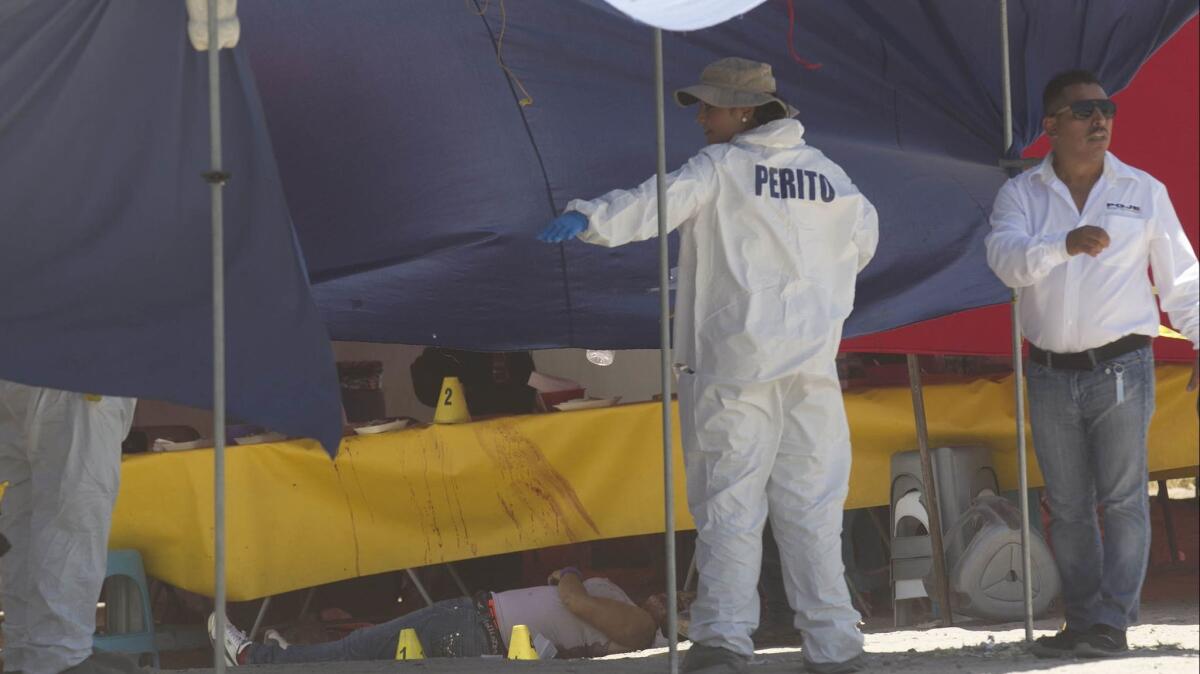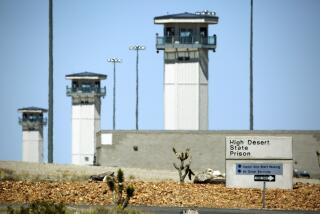Tijuana medical examiner’s office is overwhelmed by bodies

- Share via
Reporting from Tijuana — The smell is what hits you first within a block of Baja California’s medical examiner’s office in Tijuana.
It’s the unmistakable odor of rotting corpses, a grim indication of a city overwhelmed by unprecedented levels of violence.
Officials in Tijuana’s medical examiner’s office have asked the state government for additional funding after operating the facility for several months at nearly double its capacity for cadavers, on the heels of last year’s record violence.
Law enforcement officials on both sides of the border said the spike in violence is mostly due to lower-level drug dealers fighting over street corners.
Judge Salvador Juan Ortiz Morales said the issue was urgent and called on the state government of Baja California to fund an additional refrigerator to hold an extra 100 bodies.
“There are days where the smell is worse than others,” said Marcela Lopez, who works in a laundromat downwind from the coroner’s office.
The office’s capacity is between 130 and 150 bodies, but Dr. César Raúl Gonzáles Vaca, the state’s director of the agency known as SEMEFO, told Spanish-language media this week that the office is receiving at least double that amount. He said that at times, the morgue is at quadruple that capacity, with up to 20 cadavers daily, or up to 600 bodies a month.
In 2018, the agency received more than 2,700 bodies, he said.
For families who have lost loved ones, it means long waits and confusion because there is a lack of personnel to assist them.
“There is order, but it does not happen fast,” said Beatrice Espinoza who was at the office last week to reclaim the body of a family member who had passed away more than a week ago.
Espinoza said she had been jumping through bureaucratic hoops for days with no one available to explain the process to her as she tried to plan a funeral and retrieve her family member’s body. She declined to say how her loved one died.
“I know it’s not the fault of the people who are working here. They are trying very hard with the resources they have,” she said. “Still, for me, I’d rather just grieve and not have to come back here four times to sort out the paperwork because they don’t have the personnel.”
The facility’s 26-member staff, which includes 12 medical examiners, have struggled with the hundreds of bodies that have arrived since Jan. 1.
About half of the autopsies are conducted on homicide victims, but medical examiners also must certify the causes of death of involuntary manslaughter victims and accidental deaths that could be suspicious.
“Right now, I’m just sad and I haven’t given much thought to anything else,” said Kimber Villa, who was waiting for her older brothers to come identify the body of her youngest brother.
She said he died accidentally in his home.
“It’s harder though, because you wonder: ‘How is he being treated in there?’ ” Villa said.
Arturo Mendoza, who works at a funeral home nearby, said the medical examiner’s office has been struggling day and night with staffing issues, especially after increasing the hours they are open to the public.
“Sometimes, people have a hard time getting their loved one’s body back just because they have a lack of staffing,” he said.
By law, SEMEFO will wait 15 days for the body of a loved one to be recovered before the deceased is buried in Tijuana’s common grave.
With more than 2,500 homicides last year, Tijuana, which has a population of about 1.8 million, is one of Mexico’s most violent places, as drug cartels compete for control over northern trafficking routes.
Gonzáles said sometimes family members are afraid to come identify their loved ones’ bodies for fear of inserting themselves into police investigations.
Fry writes for the San Diego Union-Tribune.
More to Read
Sign up for Essential California
The most important California stories and recommendations in your inbox every morning.
You may occasionally receive promotional content from the Los Angeles Times.










